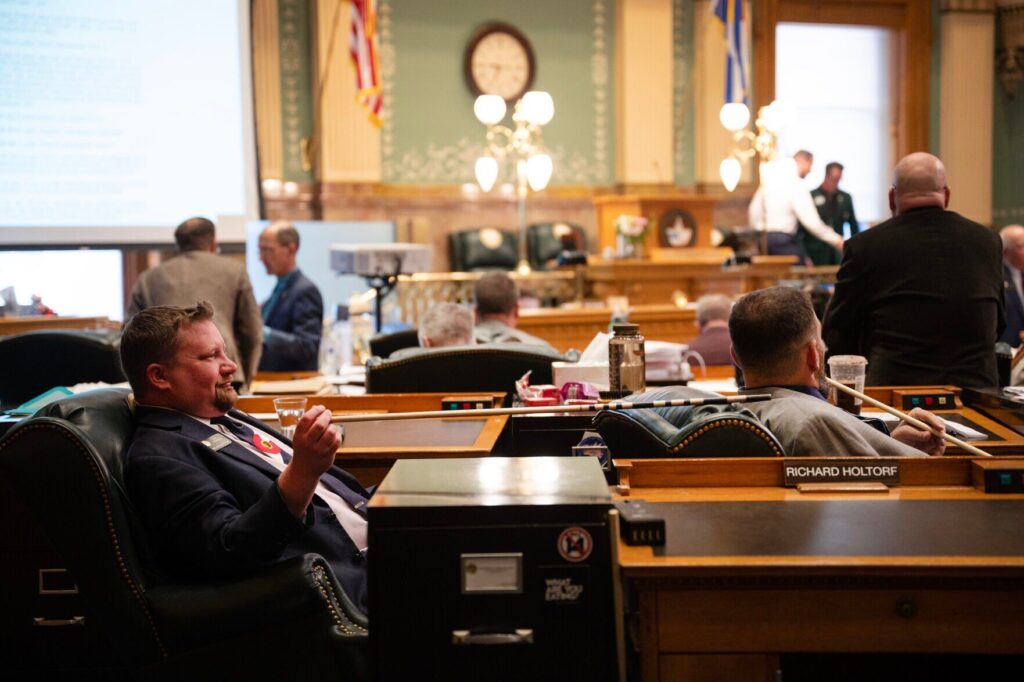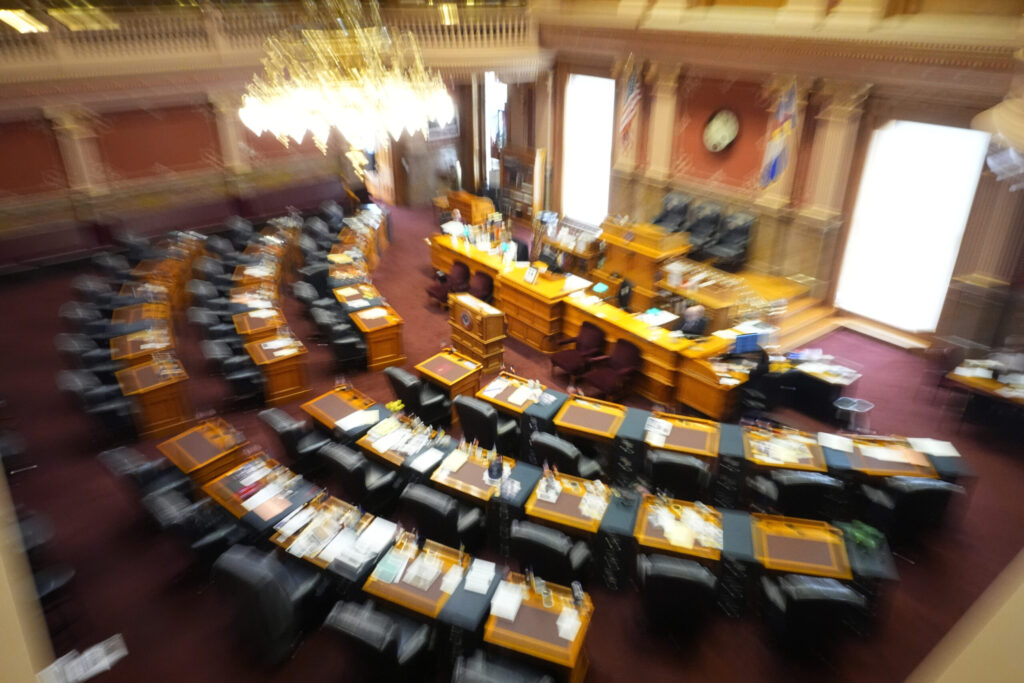Colorado Republicans celebrate policy wins in 2024 legislative session
House and Senate Republicans celebrated big policy wins during the 2024 legislative session, in particular focusing on property taxes and an income tax rate reduction.
“I’m very happy at what our caucus was able to do,” said House Minority Leader Rep. Rose Pugliese of Colorado Springs, who added that Republicans accomplished much in the 2024 session.
Pugliese cited housing measures with Republican sponsorship, including include House Bill 1152, the accessory dwelling unit bill, and House Bill 1308, which would push the state’s Division of Housing to move a little faster in releasing resources for affordable housing development.
Pugliese also pointed to the income tax rate reduction in Senate Bill 228, which will lower the rate from 4.4% to 4.25%. She noted a conversation she had with the governor following the failure of Proposition HH, the Democrat-backed property tax measure, at last November’s ballot.
“We finally were in a place where Democrats agreed that we can do that,” she said.
Addressing the change in tenor in the 2024 session, Pugliese said that, as a caucus, they decided if the majority of Democrats used Rule 14, which limits debate, they would make life on the floor a little more difficult, having bills read at length and other efforts to slow down the agenda.
She complimented Majority Leader Monica Duran of Wheat Ridge for the bipartisanship spirit they developed. All her caucus wanted was to have the ability to speak and represent their constituents, she said.
“We finally got into a place where we could have our conversations (with) meaningful and well-thought-out debates on the policy issues that were most important to us and our constituents,” she explained.
The name of the game in the legislature is about building relationships, but in 2023, with so many new lawmakers in the House, everyone was learning to find their way, she said, adding there was resistance to bipartisan efforts.
But after the failure of Proposition HH, the conversations changed, she said.
There were still free speech issues, such as the list of words the minority party was given and told they could not use.
“That is an ongoing conversation that was not resolved at the end of the session,” she said.
Regarding property taxes, Rep. Lisa Frizell of Castle Rock, a cosponsor of Senate Bill 228, noted the lengthy negotiations that led to the bill, which was introduced three days before the session ended. She said it was important to understand that, if the legislature did nothing and just waited to see what happened on the November ballot, there would be several negative consequences.
Notably, the temporary reduction in the residential assessment rate, part of the 2023 property tax bill, would ratchet back up to 7.05%.
“We had to do something,” she said.
Frizell said the compromise also stabilizes school funding. It’s not a perfect solution, but it’s something lawmakers can build on in the future.
Republicans would not say where they stood on Initiative #50, which is already on the November ballot and would cap property tax increases, or Initiative #108, which would reduce assessment rates for both homeowners and commercial property owners.
“We are not taking positions on ballot initiatives,” Pugliese said. “We are for reducing taxes, and so anything that reduces taxes and giving gives people choices I think is important.”
Rep. Matt Soper of Delta saluted the work of his caucus, noting members represent 46% of Coloradans. The caucus brought the “kitchen table” issues of most concern to Coloradans to the Capitol and that focus will help voters put more Republicans into the House, he said, predicting the caucus could grow to 25 or 27 in November’s elections.
Other highlights of the session
A bill from Rep. Richard Holtorf of Akron will reduce the state income tax on social security benefits for those between 55 and 64. Holtorf noted that he and his co-sponsor, Rep. Junie Joseph, D-Boulder, faced a “big lift” on the bill, but it won final passage on the session’s last day with unanimous support from the Senate.
Addressing public safety issues, Rep. Ryan Armagost of Berthoud noted the defeat of House Bill 1460, which surfaced in the session’s final weeks. It would have required law enforcement agencies to investigate all reported allegations of officer misconduct and failure to do so would have constituted workplace discrimination, for which civil action may be initiated.
He pledged to bring a “proactive” law enforcement bill in the 2025 session. Armagost also talked about the gun bills pushed by Democrats, which were opposed by law enforcement. He was not happy about restricting citizens from protecting themselves “because law enforcement admitted they’re not there to protect people.”
“They’re there to respond and react,” he said.
Armagost was a sponsor, along with Rep. Marc Snyder, D-Colorado Springs, of a bill to make theft of a firearm from a motor vehicle, a Class 6 felony. That bill died in its first committee hearing in February but was resuscitated late in the session as an amendment to a bill mandating safe storage of firearms in motor vehicles. That led to angry accusations from its House sponsors and to two conference committees who attempted to resolve the issue. In the end, penalties were amended in the bill.
“We need to focus on the criminal aspect of firearms” and not on the actions of law-abiding citizens, Armagost said, vowing to bring the measure back next year.
The major water bill of the 2024 session started as two competing bills that intended to address protections for Colorado wetlands merged into one near the end of the session. Rep. Marc Catlin of Montrose said he had hoped to see a measure that would address only the wetlands that needed protecting in the wake of a 2022 U.S. Supreme Court decision. The House measure went far beyond that, something Catlin said he could not support.
Negotiations with the sponsor, House Speaker Julie McCluskie, resulted in a permit program that Catlin said “will probably work.” However, Catlin still has concerns that the state Department of Public Health and Environment may not have the staffing to implement the program, which raises concerns, particularly around permits tied to affordable housing, that he said could be slowed down.
On the Senate side, Senate Minority Leader Sen. Paul Lundeen, R-Monument, pointed to tax and regulatory relief with Republican-crafted efforts to reduce income and property taxes.
“We’re grateful our commonsense colleagues on the other side of the aisle joined in on many of those efforts,” he said.
As to its impact on the ballot measures, Lundeen noted Coloradans would see $1.3 billion in property tax relief and about $466 million in income tax relief.
“When we lead well and get ahead, then I think outside the building, the initiatives become less of a factor than they can be,” he said.
At the news conference, Senate Republicans did not commit to whether they would support two ballot initiatives on property taxes.
Initiative #50’s impact on the state budget has been estimated at $3 billion, and Lundeen said the way to cover that hit if it passes is not to grow government but to put funding into priorities, instead of creating new offices or departments.
They also pointed to more than 40 bills they worked to kill they said would have been bad for the economy.
Speaking of the overhaul of the state’s school finance formula, a bill on which he was a co-sponsor, he said it would fund students rather than systems.
What Republicans wanted and didn’t get were bills designating nuclear energy as clean energy; a measure to set up a statewide children’s behavioral health system that came with a price tag in the hundreds of millions of dollars in its out years; another to exempt certain orphan drugs from the state’s prescription drug affordability board; and, a bill on charter school transparency that Assistant Minority Leader Sen. Bob Gardner of Colorado Springs said would better inform parents on educational opportunities.
Sen. Cleave Simpson of Alamosa cheered the end of Senate Bill 159, which would have eventually prohibited oil and gas production, and the success of the dredge and fill the bill.
As a water nerd, “to watch how this process unfolded this year was amazing,” Simpson said.
Meanwhile, the defeat of a bill that would have studied a single-payer health care system in Colorado was important to Sen. Jim Smallwood of Parker, whose signature effort in the health care arena was a bill to allow businesses of 50 to 100 employees to obtain large group insurance rates on health insurance.
That, he said, will save those businesses money.











